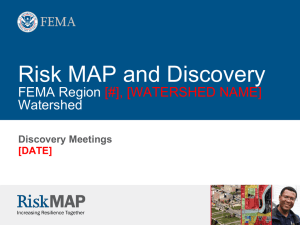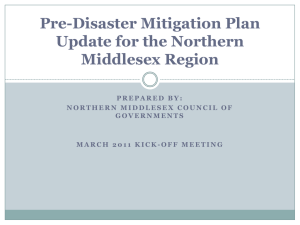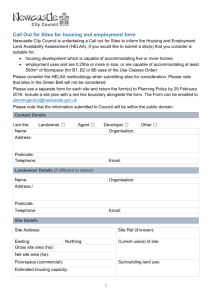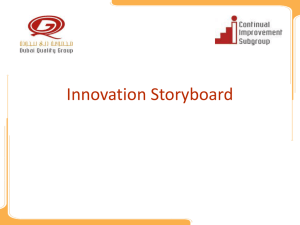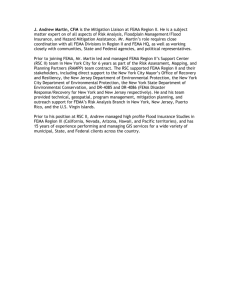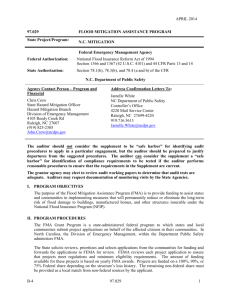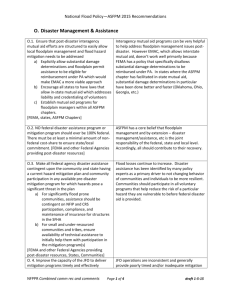SWACAction_Flood Mitigation_May212015_final_TT
advertisement
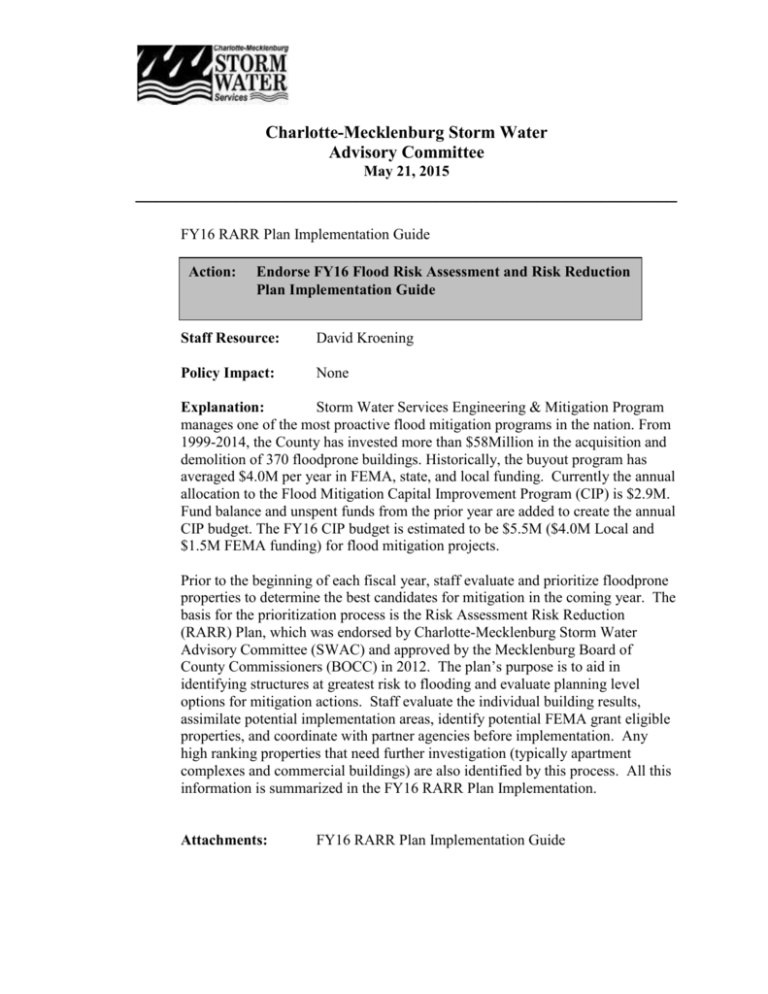
Charlotte-Mecklenburg Storm Water Advisory Committee May 21, 2015 ______________________________________________________ FY16 RARR Plan Implementation Guide Action: Endorse FY16 Flood Risk Assessment and Risk Reduction Plan Implementation Guide Staff Resource: David Kroening Policy Impact: None Explanation: Storm Water Services Engineering & Mitigation Program manages one of the most proactive flood mitigation programs in the nation. From 1999-2014, the County has invested more than $58Million in the acquisition and demolition of 370 floodprone buildings. Historically, the buyout program has averaged $4.0M per year in FEMA, state, and local funding. Currently the annual allocation to the Flood Mitigation Capital Improvement Program (CIP) is $2.9M. Fund balance and unspent funds from the prior year are added to create the annual CIP budget. The FY16 CIP budget is estimated to be $5.5M ($4.0M Local and $1.5M FEMA funding) for flood mitigation projects. Prior to the beginning of each fiscal year, staff evaluate and prioritize floodprone properties to determine the best candidates for mitigation in the coming year. The basis for the prioritization process is the Risk Assessment Risk Reduction (RARR) Plan, which was endorsed by Charlotte-Mecklenburg Storm Water Advisory Committee (SWAC) and approved by the Mecklenburg Board of County Commissioners (BOCC) in 2012. The plan’s purpose is to aid in identifying structures at greatest risk to flooding and evaluate planning level options for mitigation actions. Staff evaluate the individual building results, assimilate potential implementation areas, identify potential FEMA grant eligible properties, and coordinate with partner agencies before implementation. Any high ranking properties that need further investigation (typically apartment complexes and commercial buildings) are also identified by this process. All this information is summarized in the FY16 RARR Plan Implementation. Attachments: FY16 RARR Plan Implementation Guide Charlotte-Mecklenburg Storm Water Advisory Committee May 21, 2015 ______________________________________________________ New RetroFIT Program Policy Document Action: Endorse general concepts contained within the RetroFIT Program Policy Document Staff Resource: David Goode Policy Impact: New program would provide financial and technical assistance to floodplain property owners so they can implement flood damage reduction techniques to their structures. Explanation: Storm Water Services Engineering & Mitigation Program manages one of the most proactive flood mitigation programs in the nation. From 1999-2014, the County has invested more than $58Million in the acquisition and demolition of 370 floodprone buildings. The FY16 CIP budget is estimated to be $5.5M ($4.0M Local and $1.5M FEMA funding) for flood mitigation projects. For FY16 staff is proposing to launch a new program, RetroFIT (Floodproofing ● Improvements ● Together), that will aid floodplain property owners in making their dwellings more resilient to flood damage. Some floodprone properties are not cost-effective to acquire or are not eligible for FEMA grants. Thus, they continue to suffer short- and long-term flood damage when local creeks rise. The purpose of SWS’s RetroFIT program is to fill this gap in services by providing financial and technical assistance to floodplain owners that do not qualify for FEMA mitigation grants or buy-outs. In June 2014, the North Carolina Legislature adopted NC GS153A 274.1, allowing Mecklenburg County to use storm water fees to implement flood damage reduction techniques that result in improvements to private property. As required by the legislation, staff will present a policy document to the BOCC for approval in July. In FY16, the RetroFIT program will debut as a pilot program, offering grants to owners to cover 75%-90% of the mitigation project cost. Initially $250k of the $4.0M FY16 Flood Mitigation CIP budget will be dedicated to the program. Staff will use the RARR as a guide for decision-making under the RetroFIT program. Attachments: Draft RetroFIT Program Policy Document
